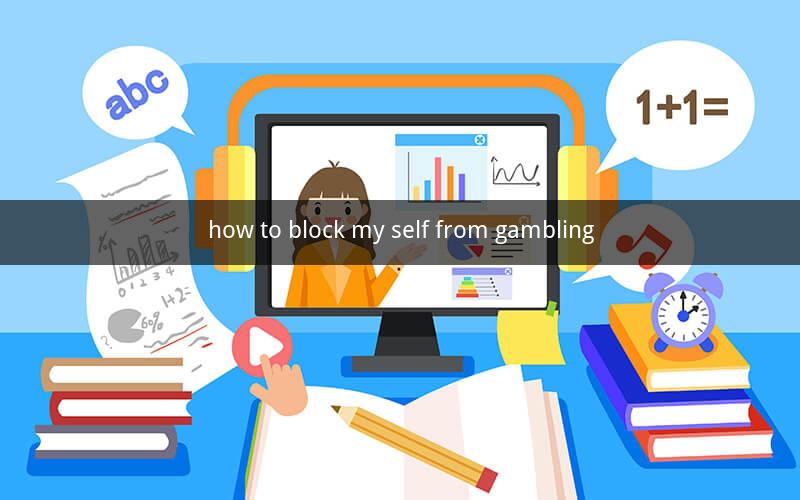
Table of Contents
1. Introduction to Gambling Addiction
2. Recognizing the Signs of Problem Gambling
3. Understanding the Reasons Behind Your Gambling Habit
4. Strategies to Block Yourself from Gambling
4.1. Create a Safe Environment
4.2. Use Technology to Your Advantage
4.3. Seek Support from Friends and Family
4.4. Find Alternative Activities
4.5. Establish a Strong Support System
5. The Importance of Professional Help
6. Conclusion
1. Introduction to Gambling Addiction
Gambling addiction is a serious condition that affects millions of people worldwide. It can lead to financial, emotional, and social problems, and in some cases, it can even be life-threatening. Understanding how to block yourself from gambling is crucial in overcoming this addiction and reclaiming your life.
2. Recognizing the Signs of Problem Gambling
To effectively block yourself from gambling, it's important to first recognize the signs of problem gambling. These may include:
- Feeling restless or irritable when not gambling
- Needing to gamble with increasing amounts of money to achieve the desired thrill
- Feeling a sense of compulsion or urgency to gamble
- Continuously chasing losses
- Lying to hide the extent of your gambling
- Neglecting responsibilities at work, home, or school due to gambling
3. Understanding the Reasons Behind Your Gambling Habit
Understanding why you gamble can help you develop effective strategies to block yourself from this behavior. Some common reasons for gambling include:
- Escape from reality
- Need for excitement or stimulation
- Financial stress or problems
- Social pressure or influence
4. Strategies to Block Yourself from Gambling
4.1. Create a Safe Environment
Start by identifying the places and situations that trigger your gambling urge. Remove any gambling-related items from your home and workplace. Inform friends and family about your situation, so they can help you stay away from temptation.
4.2. Use Technology to Your Advantage
Install gambling-blocking software on your devices to restrict access to online gambling sites. Set limits on your spending, and consider using budgeting tools to track your finances. Additionally, you can use apps that remind you to take breaks from gambling.
4.3. Seek Support from Friends and Family
Share your struggles with trusted friends and family members. They can provide emotional support and hold you accountable. Consider joining a support group for individuals struggling with gambling addiction.
4.4. Find Alternative Activities
Find healthy and productive activities to replace your gambling habit. Engage in hobbies, exercise, or volunteer work. These alternatives can help you stay occupied and reduce the urge to gamble.
4.5. Establish a Strong Support System
Surround yourself with individuals who support your decision to overcome gambling addiction. This may include counselors, therapists, or professionals specializing in addiction treatment. Establishing a strong support system can increase your chances of success.
5. The Importance of Professional Help
If you find it challenging to block yourself from gambling, it's essential to seek professional help. A therapist or counselor can provide personalized strategies and support to help you overcome your addiction. In some cases, medication or residential treatment may be necessary.
6. Conclusion
Blocking yourself from gambling is a crucial step in overcoming addiction. By understanding the signs, reasons, and effective strategies, you can take control of your life and move towards a healthier, more fulfilling future.
Questions and Answers:
1. What are the first steps to take when you realize you have a gambling problem?
Answer: The first steps include recognizing the signs of problem gambling, seeking support from friends and family, and considering professional help.
2. How can you create a safe environment to block yourself from gambling?
Answer: You can create a safe environment by removing gambling-related items from your home and workplace, informing friends and family, and using technology to restrict access to gambling sites.
3. What alternative activities can help replace the urge to gamble?
Answer: Alternative activities can include hobbies, exercise, volunteer work, or engaging in social events with non-gambling activities.
4. How can technology help in blocking yourself from gambling?
Answer: Technology can help by installing gambling-blocking software on your devices, setting spending limits, and using apps to remind you to take breaks from gambling.
5. What is the role of support groups in overcoming gambling addiction?
Answer: Support groups provide emotional support, share experiences, and offer practical advice to individuals struggling with gambling addiction.
6. When is it necessary to seek professional help for gambling addiction?
Answer: It's necessary to seek professional help if you find it challenging to block yourself from gambling, if your addiction is causing significant problems in your life, or if you've tried other strategies without success.
7. Can medication be used to treat gambling addiction?
Answer: Yes, in some cases, medication can be used to help manage the symptoms of gambling addiction, particularly when combined with therapy.
8. How can you hold yourself accountable for staying away from gambling?
Answer: You can hold yourself accountable by setting goals, tracking your progress, and sharing your achievements with a support system.
9. What are the long-term effects of gambling addiction on your life?
Answer: Long-term effects of gambling addiction may include financial ruin, damaged relationships, mental health issues, and legal problems.
10. How can you maintain your sobriety from gambling?
Answer: To maintain sobriety, continue to seek support, engage in healthy activities, and remind yourself of the reasons why you want to overcome your gambling addiction. Stay vigilant and be prepared to address any potential triggers.